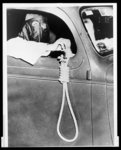The 19th Amendment
Over a hundred years ago, on August 18, 1920, the 19th Amendment to the U.S. Constitution became official when Secretary of State Bainbridge Colby signed a proclamation certifying its ratification. The Amendment promised women that their right to vote would not be denied based on sex. However, this is a myth that all women were granted the right to vote. This Amendment did not win the vote for most black women, and it did not eliminate the state laws that operated to keep Black Americans from the polls. For Black women, the ratification of the 19th Amendment was the start of a new fight. It wasn’t until the passage of the 1965 Voting Rights Act, which outlawed discriminatory voting practices.
The Suffrage Movement
Black women played an active role in the struggle for universal suffrage during the 19th and 20th centuries. The women’s suffrage movement had its roots in the anti-slavery movement, early suffragist leaders, including Elizabeth Cady Stanton and Susan B. Anthony would later fight for black women and their alliance with abolitionists. Anthony and Stanton championed equality for black Americans, even signing an 1864 congressional petition that pushed for the passage of the 15th Amendment.

Elizabeth Cady Stanton
Black American women attended political conventions at their local churches, where they planned strategies to gain the right to vote. They had a large platform because they worked for churches, newspapers, secondary schools, and colleges, giving them a larger platform to promote their ideas. However, the Black woman was left out of civil rights organizations’ leadership, and The National American Woman Suffrage Association prevented Black women from attending their conventions. They often had to march separately from white women in suffrage parades.
The 15th Amendment
It allowed Black men the right to vote while white women were denied. However, black men began attempting to exercise their legally protected right to vote but were met by lynch mobs. When the 15th Amendment passed by Congress February 26, 1869. Ratified February 3, 1870, white suffragists began pushing harder for voting rights for white women, to the exclusion of black, Native American, and Asian women. Section 1 of this Amendment states, “The right of citizens of the United States to vote shall not be denied or abridged by the United States or by any State on account of race, color, or previous condition of servitude.“
The 15th Amendment expressly forbade states from denying the vote because of race. But by 1920, legislatures in the South and West had set in place laws that would affect Black Americans, from creating poll taxes, literacy tests, and a grandfather clause kept many Black people from voting. Besides, the threat and intimidation of lynching created fear among many Black Americans. There were 5.2 million Black women, and 2.2 million lived in the South, where Jim Crow laws threatened to keep them off the registration books.
“I will cut off this right arm of mine before I will ask for the ballot for the Negro and not for the woman,” – Susan B. Anthony
Lynching
Between 1877 and 1950, about 4,000 black people, primarily black men, were lynched for perceived infractions, including registering to vote. Nevertheless, Ida B. Wells-Barnett, a prominent journalist, championed anti-lynching from Chicago, was considered integral to the fight for voting rights. To help obtain voting rights for black women, Wells-Barnett founded the Alpha Suffrage Club of Chicago. The National Association of Colored Women’s Clubs (NACW), formed in 1896 to merge several black women’s social clubs, also included suffrage within its platform.

Obstacles today regarding the right to vote as a Black American still exist today, as it has always been borne of struggle. The battles women fought 100 years ago and that now in 2020 as American women continue to work against voter suppression and full access to the polls.
Work Cited
Re: Sterling Walter Massingill – Genealogy.com. https://www.genealogy.com/forum/surnames/topics/massengill/251/
Women’s Suffrage Leaders Left Out Black Women | Teen Vogue. https://www.teenvogue.com/story/womens-suffrage-leaders-left-out-black-women
The 19th Amendment Did Not Grant Voting Rights to All …. https://zora.medium.com/a-non-whitewashed-history-of-the-19th-amendment-and-womens-right-to-vote-19c571dc1000
Between Two Worlds: Black Women and the Fight for Voting …. https://www.nps.gov/articles/black-women-and-the-fight-for-voting-rights.htm
Women’s Suffrage Leaders Left Out Black Women | Teen Vogue. https://www.teenvogue.com/story/womens-suffrage-leaders-left-out-black-women
The Effects Of Residential Segregation In America – 1204 …. https://www.cram.com/essay/The-Effects-Of-Residential-Segregation-In-America/PK5RJZ9GR4E5
Abdullah, Jinaki. “African Americans And The Vote.†Muslim Journal, vol. 45, no. 23, Muslim Journal, 21 Feb. 2020, p. 5.


